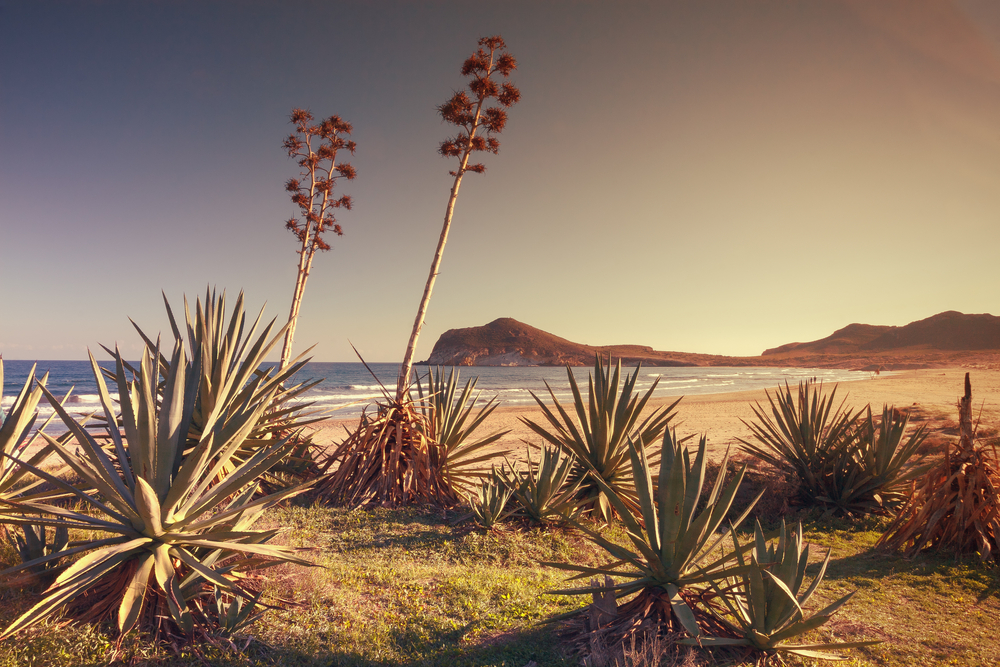Would you like to get to know
Spain
outside the well-known holiday regions around the
Costa Brava
, Costa del Sol and the
Balearic Islands
? Then you might want to consider a visit to Almeria. Almeria is both the name of a province in Andalusia in southern Spain and the provincial capital. The region convinces with several points: on the one hand, it is much less overcrowded with tourists than southern Andalusia around the Costa del Sol. On the other hand, it has interesting and impressive landscapes and places to offer both on the coast and in the hinterland.
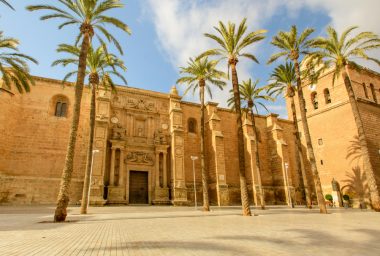
Due to the average of about 3000 hours of sunshine per year, Almeria is a worthwhile destination all year round. While penetrating currents of the Atlantic ensure a mostly moderate water temperature in southern Andalusia, the sea temperature in Almeria is usually a few degrees warmer even after the summer months. So you can often still swim there in late autumn!
Exploring the provincial capital of Almeria and its surroundings
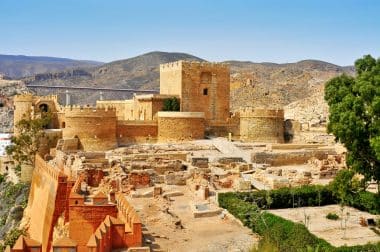
On a holiday in the Almeria area, visitors will sooner or later make a stop in the provincial capital. Thanks to its manageable size, it can be easily explored on foot. Even on warm days, it is wonderful to stay in the old town, which has a very large selection of cafés, bars and restaurants. To get a good view of the city, a visit to the Alcazaba is recommended. The fortress, built by the Moors, also gives visitors an overview of the city’s history.
On the way to the city, visitors have probably noticed that large parts of the landscape are littered with plastic sheeting. Almeria is also known as the fruit and vegetable garden of Europe due to the sometimes almost endless expanses of greenhouses. The mild and warm climate all year round favours the cultivation of vegetable varieties, which is why many tomatoes that can be bought in Germany in winter come from Almeria. Due to strict restrictions, a visit to the plantations is not possible – but it is still worthwhile to drive past greenhouses in a rental car. At least you get a small insight into an economic sector that strongly shapes the region.
Natural beaches in Cabo de Gata
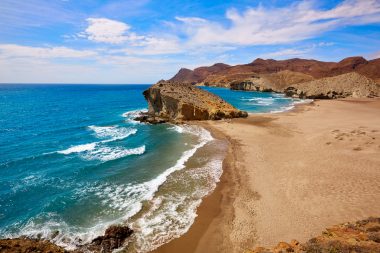
What is certainly very remarkable about the province of Almeria is that it shows the contrasts between culture and nature like hardly any other in Spain. While greenhouse plantations characterize large parts of the area on the one hand, travelers can find some untouched nature in the Cabo de Gata nature reserve.
The reserve is particularly convincing because it does not lose its face even in the high season and mass tourism is a foreign word here. This is due, among other things, to the regulations that affect the development and the offering of holiday accommodation. Cabo de Gata is often used as a holiday home for Spaniards in the immediate vicinity, which gives tourists an authentic picture without excessive foreign tourism. Small towns with calming white houses invite visitors to relax after a day of sightseeing. Popular activities in Cabo de Gata include visiting one of the many beaches and bays, as well as snorkeling and hiking. On a hike through the barren landscape, every guest will sooner or later find his almost untouched dream beach – crystal clear water guaranteed!
A desert in the middle of Europe?
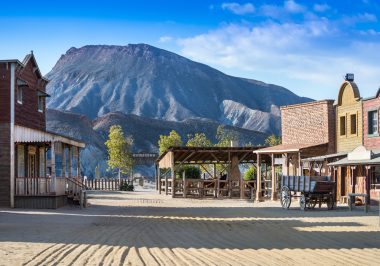
A completely different picture without water is presented to visitors in the Tabernas desert. Due to very little rainfall, an extremely dry and rugged landscape has formed, which can be reached in less than an hour from the coast. Visitors to Almeria should not miss a visit, as it is probably the only desert in Europe! This area is particularly easy to explore by car, as it allows you to stop again and again at interesting rock formations.
Film fans will get their money’s worth in the Tabernas Desert, as some film classics such as Sergio Leone’s “Play Me the Song of Death” were filmed there and not in Hollywood. Feel transported to the Wild West and hum the well-known film melody as you let your gaze roam over the vastness of the landscape. Families and children in Tabernas are also well worth a visit to the recreated Western village in the Mini Hollywood theme park.
Fish and tapas in Almeria
Whether you’ve spent the day at the beach or in the backcountry, travelers deserve a delicious meal. As in the whole region of Andalusia , dishes with fresh fish are omnipresent. Look forward to freshly caught fish fried in Andalusian olive oil!
A trip to Almeria should not be complete without a visit to the tapas bars. Since the old town is less touristy than that of Granada or Malaga, you can enjoy authentic southern Spanish cuisine on many corners.
Holidays in Almeria: Important information
Important telephone numbers
- Police: 091 (National Police), 062 (Guardia Civil)
- Fire brigade: 080
- Ambulance service: 061
- General emergency: 112
- German Embassy in Madrid: +34 91 557 90 00
- German Consulate in Málaga: +34 952 355 595
Supermarkets
- Mercadona: Avenida del Mediterráneo, 227, 04009 Almería
- Carrefour: Ctra. de Ronda, 389, 04009 Almería
- Lidl: Calle Benitagla, s/n, 04009 Almería
- Aldi: Avenida del Mediterráneo, s/n, 04009 Almería
Doctors in the most important places
- Almería:
- Dr. José Pérez: Centro de Salud Almería Centro, Calle Gerona, 19, +34 950 18 12 00
- Dr. Carmen Sánchez: Hospital Universitario Torrecárdenas, Calle Hermandad de Donantes de Sangre, s/n, +34 950 01 50 00
- Roquetas de Mar:
- Dr. Francisco García: Centro de Salud Roquetas Norte, Avenida Reino de España, 2, +34 950 33 47 50
- Dr. Ana López: Hospital de Poniente, Carretera de Almerimar, s/n, +34 950 02 01 00
Important words with translation
- Hello – Hola
- Thank you – Gracias
- Please – Por favor
- Yes – Sí
- Nein – No
- Sorry – Perdón
- Where is…? – ¿Dónde está…?
- How much does it cost…? – ¿Cuánto cuesta…?
- Emergency – Emergencia
- Doctor – Médico
- Krankenhaus – Hospital
Holidays
- New Year’s Day: January 1
- Epiphany: January 6
- Good Friday: variable (March/April)
- Labour Day: 1 May
- Assumption Day: 15 August
- National Holiday: October 12
- All Saints’ Day: November 1
- Spanish Constitution Day: December 6
- Christmas: December 25
Opening hours
- Shops: Usually Monday to Saturday from 9:00 a.m. to 2:00 p.m. and from 5:00 p.m. to 8:00 p.m. Many shops close at noon for a siesta.
- Supermarkets: Usually daily from 9:00 a.m. to 9:00 p.m.
- Restaurants: Lunch from 13:00 to 15:30, dinner from 20:00 to 23:00.
- Banks: Monday to Friday from 8:30 a.m. to 2:00 p.m.
Airport
- Almería Airport (LEI): About 10 km east of Almería
NUDISM
- Official nudist beaches: Playa de Vera, Playa de los Muertos
Post / Stamps
- Almería Post Office: Avenida Federico García Lorca, 37, 04004 Almería. Opening hours: Monday to Friday from 8:30 a.m. to 8:30 p.m., Saturday from 9:30 a.m. to 1:00 p.m.
- Stamps: Available at the post office and in many kiosks and supermarkets.
- Costs for letters and postcards to Germany: Standard letter up to 20g: approx. 1.50 EUR; Postcard: approx. 1.20 EUR
Safety
- Crime: Almería is considered relatively safe. Nevertheless, as everywhere: Pay attention to personal belongings, especially on beaches and in tourist areas.
- Emergency number: 112
Current
- Voltage: 230 volts
- Sockets: Type F (as in Germany)
Tip
- Restaurants: 5-10% of the invoice amount
- Taxis: Round up the amount
- Hotels: 1-2 euros per day for cleaning staff
Customs
- Allowances within the EU: No customs restrictions on personal belongings.
- Alcohol: Maximum 10 liters of spirits, 20 liters of alcoholic beverages with less than 22%, 90 liters of wine, 110 liters of beer.
- Tobacco: 800 cigarettes, 400 cigarillos, 200 cigars, 1 kg of tobacco.


